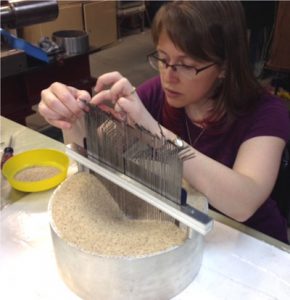 When Winona State University planetary geologist Jennifer Anderson, Ph.D., first heard the results of her NASA grant were posted, she was too nervous to look.
When Winona State University planetary geologist Jennifer Anderson, Ph.D., first heard the results of her NASA grant were posted, she was too nervous to look.
Anderson had already applied four times for a grant from NASA that would help establish a better understanding of what creates craters in space, like on the Moon or Mars. NASA had praised her application each year but ultimately denied it—until this year when she was awarded almost $500,000.
“I was actually a bit overwhelmed,” Anderson said. “With budgets the way they have been recently, it has been very difficult for a young scientist like myself at a small institution to break into NASA funding. It’s quite a message from NASA that they believe in my work and my ideas to fund me at this point.”
The majority of Anderson’s research career has been focused on studying the physics of impact crater formation, but with this funding, Anderson will be studying impact craters with more realistic surfaces, such as those with slopes or buried layers.
Working with Jeff Plescia, Ph.D., of Johns Hopkins University Applied Physics Laboratory, and Mark Cintala, Ph.D., of NASA’s Johnson Space Center, Anderson will utilize image processing, data analysis and interpretation to compare these new surfaces with existing knowledge.
The grant will also allow Anderson to support salaries and travel money for several students to work with her on creating the craters at NASA’s Johnson Space Center.
Providing hands-on learning opportunities for students isn’t something new for Anderson. Since 2006, she has taken 12 WSU students to visit the Johnson Space Center’s laboratory . Of those students, 11 have presented research projects on experimental impact cratering problems at national conventions and one student was chosen for a very competitive position as a NASA Planetary Science summer intern.
“I am very excited that this grant gives me the ability to offer so many students this incredible opportunity as undergraduates,” Anderson said. “It will help them in a number of ways as they move forward toward their professional goals.”
For Anderson, the funding from NASA is just another opportunity to do the research she is passionate about.
“These are accomplishments that I am proud of and help motivate me to share my love of science and the natural world with our students and the general public here in Winona,” Anderson said.
For more information, contact the University Communications Office at 507-457-5024.
